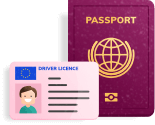
.png)
Online gambling websites must be licensed by the UK Gambling Commission to legally operate in the country. The licence imposes rules on operators to help prevent underage gambling, reduce criminal activity and protect vulnerable people.
One of the ways brands stay compliant is by verifying your account details and identity, which sometimes involves asking for personal documents such as photographic ID and proof of address.
In this guide, we’ll cover everything you need to know about verifying your gambling account and explain how new regulations may impact your gameplay.
New age verification rules
In October 2018, the UK Gambling Commission published its updated Licence Conditions and Codes of Practice (LCCP) with a focus on tighter age and identity verification requirements for online operators.
Previously, players could sign up, deposit and gamble at an online casino or bingo site before providing any identity documents.
Depending on when an operator triggered its electronic Know Your Customer (KYC) checks, players could have theoretically gambled for months, only being asked to send identity documents when they first requested a withdrawal.
Not only was this frustrating for players who felt they were being denied money they’d won fairly, but it also allowed many underage players to access gambling websites and play undetected.
The latest LCCP document came into effect on May 7th 2019. Operators that do not address the above and remain non-compliant risk losing their licence and/or being fined by the UK Gambling Commission.
Key LCCP changes - May 2019
-
Licensees must verify a player’s identity before they’re allowed to gamble.
-
Licensees can’t ask for additional verification information that could have been requested earlier while withholding withdrawal funds.
-
Licensees must tell players about the information and documentation they need to provide and how it can be provided before they are able to deposit
How the new verification rules affect players
KYC checks are now performed at registration or upon intent to deposit at a site, this can include adding a payment method or clicking the deposit button.
If you previously failed the electronic identity checks, you had 72 hours to send in relevant documents before your account was suspended. You could still deposit, gamble and withdraw during this time.
As of May 7th 2019, you are no longer able to deposit funds or access any games, including free bingo rooms and slot demos, until appropriate KYC checks are performed and your account is satisfactorily verified. You are also unable to claim promotional bonuses, such as no deposit spins or free bingo tickets.
What is a KYC check?
A Know Your Customer (KYC) check is a way that companies verify a customer’s identity. It’s a process used by thousands of businesses including banks, insurance brokers and online gaming sites.
KYC checks are usually performed electronically and compare your basic personal information (name, birthday and home address) against databases such as the electoral roll to confirm your identity.
Your information is also compared against lists of sanctioned individuals, including those suspected of being involved with crime, people likely to be complicit in money laundering and those that qualify as Politically Exposed Persons (PEPs).
If an electronic KYC check flags any inconsistencies, the gambling operator must perform Customer Due Diligence (CDD) checks. It is at this time that you will be asked to supply identity documents such as a photographic ID and proof of address.
You may also be asked for copies of your bank information and details regarding your source of funds should a company need to verify where your money is coming from or that you can afford the service they’re providing.
Why do I have to verify my gambling account?
Account verification is a regulatory requirement for all gambling operators licensed by the UK Gambling Commission. There are three main reasons for KYC checks:
-
To check that you’re old enough to gamble
In the UK, you must be at least 18 years old to gamble legally. Similarly to how you would show your ID to a bouncer at a land-based casino, it’s an operator's responsibility to check that everyone that plays on its site is old enough to play.
-
To check that you’re not self-excluded
Gambling operators must take all reasonable steps to stop self-excluded players from accessing their original accounts or creating a new account using different information.
-
To check where your money is coming from
Operators must make sure all the funds spent on their sites come from reputable sources that are not linked to crime. This is to comply with anti-money laundering (AML) responsibilities under the Proceeds of Crime Act 2002.
How to verify your online gaming account
The UK Gambling Commission’s LCCP is only a guide and player verification processes can differ between operators. Here is a general idea of what you can expect:
-
You’ll usually receive an on-site notification or email informing you of:
-
The documents required for manual verification
-
The process for submitting your documents
-
The estimated time you’ll need to wait for approval
-
Upload your documents to the designated section in your account or send them to a specified email address.
-
Most operators aim to respond within one business day after they’ve received your documents. If an operator requires more information, you will usually receive an email detailing what else you need to send.
-
Once your account has been verified, you should receive a confirmation email informing you that you can log in, deposit and claim any signup bonuses.
Which identity documents are accepted?
Below is a list of generally accepted KYC documents.
Proof of identification
A government-issued photo ID that hasn’t expired:
-
Passport
-
Driving Licence
-
National ID card
Proof of address
An official document dated within the past three months:
-
Bank statement
-
Utility bills (electricity, gas, water)
-
Council tax bill
Always read the verification requirements carefully before sending your documents to avoid a delay. Documents should show all four corners of the page, without anything cropped or altered.
Why didn’t I pass the electronic KYC check?
It can be worrying when you’re asked to send personal documents before you’ve even tried out a casino or online bingo site.
However, it doesn’t necessarily mean you’ve done anything wrong. You may have simply entered incorrect details accidentally when you signed up.
It can also be the case that databases aren’t fully updated when your KYC check is done, so you may be required to send over documents if you’ve recently moved homes or changed your name.
Operators aren’t able to tell you the specific reason why you fail a KYC check under the terms of their Gambling Commission licence, however, they will do everything they can to help you get your account verified.
Why do I need to send more documents when I’ve already verified my account?
Some operators are required to request more documents or information as part of ongoing CDD checks. Here are some circumstances where this may occur:
-
If your deposit/withdrawal exceeds the operator’s AML threshold
-
If you deposit or withdraw using a new payment method
-
If you show signs of problem gambling
-
If another player registers an account with similar details
Your account may be temporarily suspended and restrictions may be applied during the extended verification process.
Note: Under the new LCCP guidelines, operators must not delay withdrawals by asking for documents or information that could have been requested earlier.
What can I do if my verification is refused?
Being told that your account can’t be verified can be very frustrating, but before you start shouting at the customer service team (typing in all caps also counts as shouting), take a look at the most common reasons why your verification may be legitimately refused:
-
Your identification documents are not valid
-
You can’t provide photographic ID, such as a passport or driving licence
-
Your utility bill or bank statement is more than three months old
-
Your submitted information is inconsistent with the details you registered with
-
You are suspected of having more than one account
-
You have previously self-excluded from the site, another site on its network or via the GamStop national exclusion programme
-
Your name is associated with links to crime
In the rare case you aren’t able to verify your account, you should follow these steps:
-
Make sure it’s an unsolvable problem
It’s in the best interests of operators to verify players’ accounts so they can start depositing and spending money, making it unlikely that you’re being denied verification maliciously.
If you don’t have a valid form of photo ID or do not want to send in your bank statement, a site cannot legally allow you to gamble. We recommend checking any previous communication before reporting the issue as it might be as simple as sending a clearer picture of your driving licence.
-
Speak to the customer service team
You may not receive adequate information about why your account hasn’t been verified if an operator uses a digital upload system.
Speaking to a customer service representative via phone, live chat or email can help to provide more clarity.
-
Make an official complaint
If you’ve signed up using your correct information, sent valid identification documents and are using legal funds to play, there should be no reason why you can’t verify your account.
If you believe that an operator is illegitimately denying you an account, you should make a formal complaint by following its official complaints procedure. You can usually find this in a site’s terms and conditions.
Why haven’t I been asked for verification documents?
Many players will never be asked for documents as electronic KYC checks have an average pass rate of 85% or higher. You will usually pass verification automatically if you’ve entered the correct information and the databases that your details are checked against are up-to-date.
A gambling operator is required to ask for further information regarding your financial situation once your deposits or withdrawals exceed a predetermined threshold. This is to comply with anti-money laundering and social responsibility regulations.
The amount of money varies between sites but is usually around £2,000. If you’re a casual player or only deposit £10 or £20 a month, you probably won’t hit those thresholds for a while.
Finally, it’s worth checking if you’re playing at an unlicensed gambling operator. Most, if not all, UK licensed operators will display their licence information in the footer which you can look up on the Gambling Commission’s official website.
If you’re unable to find a licence number easily, we suggest avoiding this site as its unlikely to have AML processes in place and your information may become linked to something dodgy in the future.








